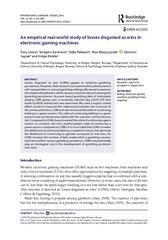An empirical real-world study of losses disguisedas wins in electronic gaming machines
Peer reviewed, Journal article
Published version

View/
Date
2016Metadata
Show full item recordCollections
Original version
https://doi.org/10.1080/14459795.2016.1232433Abstract
Losses disguised as wins (LDWs) appear to reinforce gambling persistence. However, little research has examined this phenomenon with real gamblers in natural gambling settings. We aimed to examine the relationship between within-session outcome size and subsequent gambling persistence. Account-based gambling data of individuals playing LDW games over a randomly selected day (2,035,339 bets made by 8636 individuals) was examined. We used a logistic mixed effects model to examine the relationship between the outcome of the previous bet (loss, LDW and real wins) and the odds of continuing betting in a game session. The odds of continuing betting in a game session were positively associated with the outcome of the previous bet. Compared to LDWs, losses lowered the odds of continuing a game session. In contrast, real wins implied greater odds of continuing a game session compared to LDWs. It is concluded that LDWs increase the likelihood of continuing betting compared to losses, but decrease the likelihood of continuing to gamble compared to real wins. As LDWs increase the number of bets made within a gambling session, and hence within-session gambling persistence, LDWs may potentially play an etiological role in the development of gambling problems over time.
